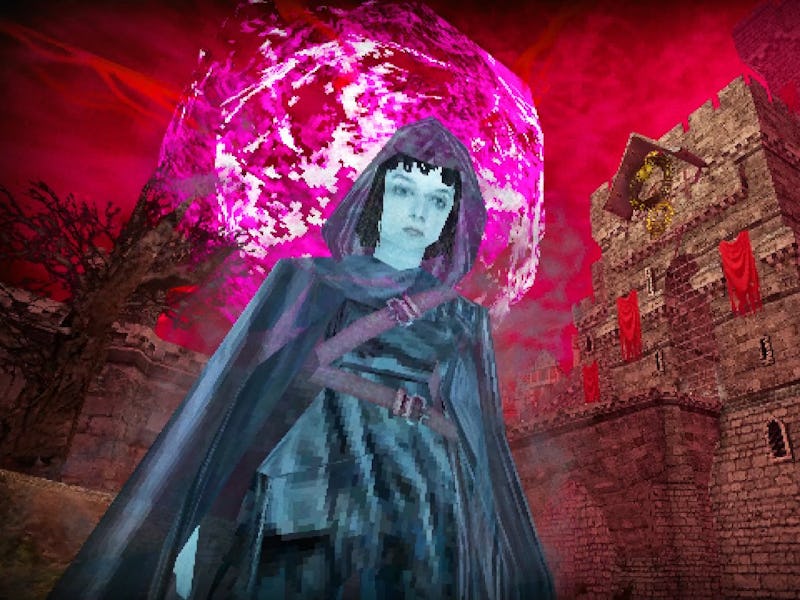Dread Delusion feels like Lovecraft made an Elder Scrolls game
Who needs a main story with all these side quests?

The residents of Hallow live their lives under the ever-present neuron star, the world is shattered and those that remain cling to life on islands in the sky. This is Dread Delusion, a new RPG in early access from developer Lovely Hellplace. Dread Delusion combines elements from Elden Ring, Elder Scrolls, and the retro aesthetic of the PS1. Even in its incomplete form, the game offers such deep worldbuilding that I felt compelled to turn over every rock and find every secret available to me. Who needs one thousand planets when a game like this can offer such expertly crafted experiences that still give the player a sense of scale?
As a newly released prisoner, it is your job to track down and apprehend the outlaw, Vela Callo. This is a setup that sounds right out of an Elder Scrolls game. Before being released to the world, you set your character's attributes based on a handful of backstory options, I choose to boost my Wisdom and Guile as I prefer to be sneaky. Once the short intro quest is completed, Dread Delusion opens its map, letting you explore to your heart's content. See that mountain? You can go there.
A PS1 aesthetic coats this deeply compelling RPG.
Retro is in — Dread Delusion is billed as a retro horror RPG with PlayStation 1 visuals. The basic mechanics of the game are heavily inspired by earlier Elder Scrolls titles. It harkens back to the tabletop roots of roleplaying video games with lockpicking visualized by a literal roll of the dice and players needing to boost stats to pass skill checks. The Oneiric Isles, the game’s setting, look and feel like the island of Vvardenfell from Morrowind, down to the giant mushrooms scattered across the landscape.
But Dread Delusion isn’t just a Morrowind clone; The Lovecraftian horror elements are as palpable as the RPG influences. Dread Delusion began life as one of several demos on the Haunted PS1 Demo Disc 2020. The Demo Disc was made to evoke an existential horror in the player through a collection of unsettling games all in the style of the PS1. In the case of Dread Delusion, the brand of horror is cosmic. The main struggle between people in Dread Delusion is between those who worship the gods, cosmic beings that can fulfill prayers to dangerous effect, and the Apostatic Union, a group of anti-occult militants that exercise power over much of the land. This struggle propels the player, but along the way, you will meet many regular people just trying to survive.
In a castle that sits prominently on a hill on the island of Halloshire (one of two currently available Islands to explore), I encountered a noble on a throne. I only found him after drinking a potion to dispel illusions that revealed a hidden pathway behind a painting. He was covered in grotesque vines and told me how much pain he was in. When I inquired if I could help in some way, he said that this was a choice of his. He was subjecting himself to this fate to hold back a curse on the land, one that would lead to the death of his son. All this to appease a god!
In that same castle sat a priest devoted to the god responsible for the curse. Prayers have much power, he told me. Even the smallest wish granted by a god could have terrible consequences for the land. I could kill the priest or try to find another subject to satisfy the god’s deal. Both choices lead to suffering, it was up to me to choose what I could live with.
Side quests that blend fantasy and cosmic horror make the limited map feel full of secrets to uncover.
Bigger isn’t always better — Currently, Dread Delusion mostly offers side content like this, but the stories that each quest tells are so satisfying that I sought out every one of them to learn more about this world. Even as an early access title, Dread Delusion devotes so much attention to compelling stories that the player naturally discovers and pursues that it feels like a deeper experience than many checklist RPGs of the modern era.
Todd Howard tried to sell the scale of Starfield by saying every planet in the game will be explorable — there are more than a thousand of them! The initial reaction to this was one of exhaustion. The sheer scale of procedurally generated planets could not possibly offer meaningful stories that would justify players putting in the time to the game. Dread Delusion’s success comes from its ability to convince the player that even on two small islands, an entire history of events has occurred, which builds up complicated relationships between people and factions within.
Morrowind was intentionally a smaller game than Arena and Daggerfall. To create a world that felt real, the team focused on a single island, handcrafting the world as opposed to the procedural generation of Daggerfall. This resulted in a game that still lives on in the minds of players as one of the best RPGs ever made. Dread Delusion adheres to this same development ethos to breathe new life into it by telling a story linked to cosmic horror. I am already eager to explore more islands and search out whatever stories will be waiting for me to uncover.
Dread Delusion is currently in early access on Steam.